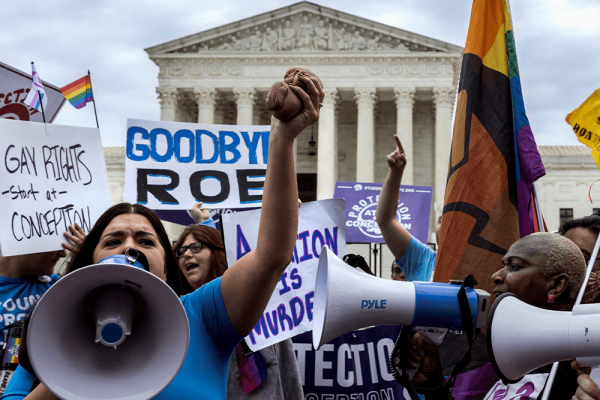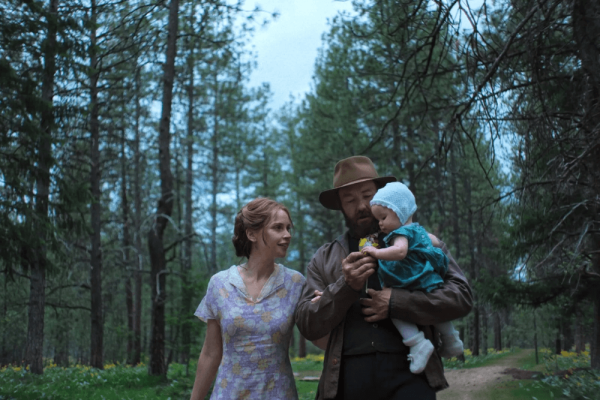The Supreme Court overturned 49 years of federal abortion rights on Friday, in its decision on Dobbs v. Jackson Women’s Health Organization. Thirteen states have trigger laws that will soon make abortion illegal at various stages, and numerous states are expected to enact or enforce laws that outlaw abortion outright.
Faith leaders and advocates told Sojourners they were not surprised by the court’s decision, which was nearly identical to the draft leaked in May. However, many leaders echoed Rev. Katey Zeh, CEO of the Religious Coalition for Reproductive Choice, who told Sojourners that “the emotional impact of a moment like this can’t be underestimated.”
For some religious groups, including conservative Catholics and evangelical Christians, ending federal abortion rights by overturning the Supreme Court’s 1973 decision in Roe v. Wade has long been a political priority. Nearly two-thirds of evangelical Protestants believe abortion should be illegal in most or all cases, according to Pew Research Center.
However, not all religious groups or people support that goal: Catholic adults are split on abortion’s legality according to Pew, and more than half of Black Protestants believe abortion should be legal in most or all cases. Sixty percent of mainline Protestants also support legal abortion in most or all cases, along with 83 percent of Jews, 55 percent of Muslims, 82 percent of Buddhists, and 68 percent of Hindus.
According to the Guttmacher Institute, a research agency that supports abortion access, 54 percent of abortion patients in the United States identify as Christian — 24 percent are Catholic and 30 percent are Protestant.
Zeh is hopeful that people of faith who support abortion rights will “disrupt … the dominant narrative” that religious people oppose abortion access.
“I hope that more people are willing to speak up for their support for people who need abortion care because of their faith, and not in spite of it.”
Support for pregnant people post-Dobbs
In the wake of the court’s ruling, faith leaders of different ideologies pointed to the need for practical support for pregnant people.
For Zeh, like other abortion advocates, faith communities should continue to support access to abortions, as many did before abortion became legal across the United States in 1973.
“There’s going to be a huge need for practical support and resources,” said Zeh. “I am very hopeful that faith communities will step up; they’re already doing that in places where abortion has been basically inaccessible.”
Rachel Anderson, a fellow working in family policy at the Center for Public Justice, a nonpartisan organization that advocates for Christian policies in public life, told Sojourners that the decision anticipates a world in which pregnant women and their children are safe.
“Christians have a responsibility to work toward that world, there is much to be done to bring us there ranging from addressing maternal mortality in the U.S., infant mortality, our lack of paid parental leave, the income shocks that many women and families face around pregnancy. Those gaps are real,” Anderson said. “I have seen, in the past year as this decision has neared, Christians across party and ideological lines really taking seriously those needs for women and children and wanting — for those who have sought restrictions on abortion — to see a world where abortion is unnecessary and women are fully protected in their pregnancy and childbirth.”
Alessandra Harris, a writer and co-founder of the Black Catholic Messenger, told Sojourners in an email that the decision was “bittersweet.”
“I’ve always considered myself prolife, but the truth is abortion is not a clear cut issue. I now consider myself to have a consistent life ethic, so the health of the pregnant woman is just as important,” Harris wrote. “I fear many women, especially low-income and Black women, will suffer because of Roe being overturned.”
She encouraged faith communities to “vote out elected officials who make it harder or impossible for pregnant women to choose life because of the policies they support.”
“We need to support women by increasing welfare, food stamps, Medicare for All, offering a Child Tax Credit, and subsidizing childcare,” Harris wrote.
Charlie Camosy, a Catholic theologian and ethicist, told Sojourners over email that the overturn of Roe should be considered a first step for pro-life advocates.
“This had to happen for the goal to be achieved, but it is time to get down to the business of protecting prenatal children and supporting their mothers, state by state,” Camosy wrote.
He wrote that Christians should look to Matthew 25, and Christ’s command to serve the “least of these” should inform Christians engaging in abortion politics moving forward.
“Prenatal children obviously bear the face of Christ in a special way as the least among us, but what makes abortion so unique is that they are literally attached to human beings who are often also on the margins,” Camosy wrote. “Any approach that fails to see two people here has failed the test of Matthew 25. We are called to see Christ in a special way in the least among us. Every single one.”
Abortion’s connection to other rights
Elaina Ramsey, executive director of Faith Choice Ohio, told Sojourners in an email that “abortion access is just one of several fundamental rights systematically under attack in the U.S., including voting rights, trans rights, and a host of other rights intertwined with our right to religious freedom.”
She also said that “people across the U.S. will soon be forced to travel hundreds of miles out of state to the nearest abortion clinic or to carry pregnancies against their will.”
Lauren Barbato, a vision council member for Call to Action, a Catholic social justice agency, told Sojourners in an email that she was worried for the safety of those seeking abortions. People with unexpected pregnancies may take riskier steps to end their pregnancy, or they may face legal consequences for attempting to end a pregnancy.
“I’m worried women — including Christians and Catholics — will face arrest, felony charges, and imprisonment for seeking care at a hospital following a self-managed abortion or miscarriage,” Barbato wrote. “As a Catholic, and a woman who had an abortion, I believe we need to give people that space to move through these experiences on their own terms. Why do we want to traumatize people — including people of faith — even more?”
Many faith leaders admit that their emotions and reactions were still fresh. “I wish that I had more eloquent words. I don’t have them right now,” Zeh said.
“I always like to address people who are seeking abortions or people who have had abortions [and tell them] they are loved and not alone,” Zeh said. “There are many people like me who support them and are here to accompany them, spiritually, through their process.”
Got something to say about what you're reading? We value your feedback!






